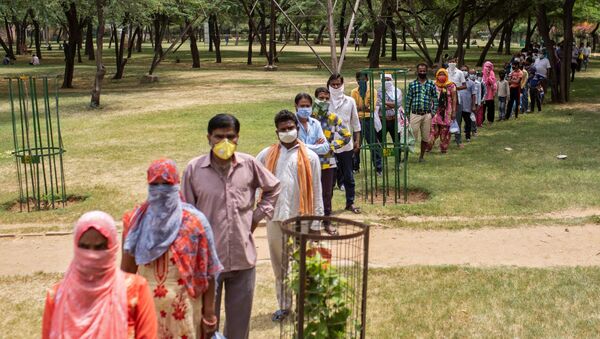While people across India have hailed the national lockdown, Delhi residents in some containment zones or hot spot areas are finding it hard to fetch daily commodities. With an assurance to deliver goods to their doorstep, their areas have been sealed by the government to strictly contain the spread of the virus.
According to the Indian Health Ministry, the national capital has recorded over 3,100 positive COVID-19 cases so far. The steady rise in COVID-19 cases has caused the number of containment zones in the city to skyrocket to 100.
Some residents from these containment zones say that while they acknowledge not being allowed to come out of their houses is for their own safety, the authorities should at least arrange for their daily needs.
"They have given helpline numbers that are dysfunctional most of the time. Secondly, the general stores that can help with basic goods are refusing to deliver anything citing various excuses", Mukesh Mehra, a resident of the GTB enclave, says.
Aditya Sharma, a resident of the Gandhi Park containment zone in Malviya Nagar (South Delhi), explains that he has been working from home since the lockdown was announced and has been shopping for groceries via e-commerce websites. He says buying vegetables from local vendors using phone calls is akin to giving oneself a headache.
"We order basic supplies and groceries through online services. But it is a big task to convince delivery boys as they refuse to enter the locality, saying they can't risk their lives. Or, sometimes they are just scared of the police that they might charge at them", Sharma continues.
He further laments that sometimes getting the internet fixed turns into a week-long task.
"Last week, I had to call the provider numerous times to repair it but they said no technician was ready to come to the area".
Sputnik has spoken to a general store owner in the Shalimar Bagh area (in North Delhi) whose shop is close to a containment zone and who has revealed that the reason for saying no to going to the area is the fear of being infected.
"Honestly, we all are unaware about the transmission of the virus. Some say it is due to the saliva, some say it can pass through by coming in contact. We are completely unaware if it can spread through objects", the owner, who doesn't wish to be identified, states, adding that keeping the delivery boys’ safety and their own safety in mind, he has to refuse the order.
A senior citizen from Janakpuri (in West Delhi) says that despite people becoming cautious about the spread of the virus, the need to spread awareness among the population about how the virus is transmitted is essential.
"We have little kids at home and it is very difficult to keep them indoors. With zero knowledge on the spread, I myself have stopped stepping outside. The immunity factor plays a vital role in this virus so the government should use different mediums for senior citizens", senior citizen Jagdish Raj Babbar explains.
According to the government, once an area is sealed, it starts what it calls operation SHIELD in which the movement of people is restricted and ensures that essential supply reaches residents. After that, the area and houses are sanitised, the home quarantine of locals, isolation, contact tracing and door-to-door checking is carried out.
India has recorded 31,332 positive coronavirus cases and over 1,000 people have lost their live due to this infectious virus, according to the federal Ministry of Health and Family Welfare.




